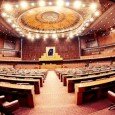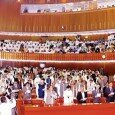By Ahmed Bilal Mehboob –
Not a bad year for the parliament but it could have been better
The two houses of the parliament, the Senate and the National Assembly, continued their slow-paced journey during 2012 towards evolution as sovereign and assertive institutions of the state. Despite the landmark 18th constitutional amendment, under which powers usurped by the office of the president during General Musharraf’s reign were returned to the parliament and its elected leader of the house, the prime minister, the parliament did not emerge as one of the strong and assertive pillar of the state.
The president, who is supposed to be a symbolic head of the state under our amended constitutional arrangement, remained the strongest person in the executive. He was taking and seen to be taking all the important policy decisions. The prime minister’s office remained practically subservient to the ruling party’s chairman. Despite this subservience, Prime Minister Yousaf Raza Gilani gradually seemed to be gaining some degree of confidence when he had to relinquish his office after the Supreme Court disqualified him as a member of the National Assembly after finding him guilty of contempt of court. The new Prime Minister, Raja Pervaiz Ashraf, looked even more subservient to the president. This imbalance in the de jure and de facto status of the executive powers remained the greatest anomaly of the year 2012 like the previous 3 years.
Disqualification of Prime Minister Gilani was one of the most profound acts of our judicial and political history and it would leave a long-lasting imprint on the psyche of our parliament and parliamentarians. A greater sense of accountability is expected to prevail upon the powerful public office holders after this development.
The parliament, and the national polity with it, moved towards greater stability after the smooth and successful conduct of the Senate election to fill its half the seats in March, 2012. These elections were the subject of repeated and intense controversy as many political analysts believed that the beleaguered PPP-led government will be sent packing before it could consolidate its position in the Senate as well after the election. These doomsday forecasts proved wrong and, routine rigging and bribing allegations aside, the Senate elections took place in time without any hitch.
The parliament passed the landmark 20th constitutional amendment during 2012. The most significant part of this amendment deals with the appointment of a neutral caretaker government in consultation with the opposition during the parliamentary election. The president had the discretionary power to appoint the caretaker prime minister during the election period before the passage of the amendment.
The government agreed to give away its powers to appoint the next caretaker government and, instead, agreed to set up the caretaker government in consultation and after reaching a consensus with the leader of the opposition. In case a consensus is not reached, the matter will be referred to a parliamentary committee with equal representation of the government and the opposition. If even this committee is unable to reach a consensus, the Election Commission will appoint the caretaker prime minister. This constitutional amendment has removed one of the major irritants in the way of free and fair election in Pakistan. The National Assembly passed 22 and the Senate 9 other laws during the year. This legislative performance is more or less in line with the performance during the preceding 3 years.
The parliament passed a controversial Contempt of Court Act, 2012 in an effort to save the prime minister from disqualification if he was found guilty of contempt of court. The law was declared void and in conflict with the constitution by the Supreme Court. Earlier, the Supreme Court had advised the parliament to amend a part of the 18th Amendment that dealt with the appointment of the judges of the Supreme Court. The parliament had complied by passing the 19th constitutional amendment.
The PPP-led coalition government had to its credit the appointment of the Leader of the Opposition in the National Assembly as the Chairman of the powerful Public Accounts Committee (PAC). The leader of the opposition, Chaudhry Nisar Ali Khan, resigned as the PAC chairman in November, 2011 as a protest against the controversial appointment of the Auditor General. The year also saw the appointment of Mr. Nadeem Afzal Chan, the plain-speaking PPP MNA from Sargodha. Mr. Chan’s election, though conducted unanimously, deprived the current parliament of the more democratic honour of appointing PAC Chairman from the opposition.
During 2012, the parliamentary committee for the appointment of the Chief Election Commissioner reached a consensus on its task. As a result, Justice (Retired) Fakhruddin G. Ebrahim was appointed as the new Chief Election Commissioner. This bi-partisan appointment and the selection of a highly respected person as the CEC further improved the prospects of free and fair election in Pakistan. The fact that the ruling coalition and the opposition can reach an agreement even on some of the most controversial issues gave confidence to the political parties and parliamentarians.
During 2012, another innovative step was taken by the Senate Committee on Defense and Defense Production under its new chairman, Senator Mushahid Hussain Sayed, to hold public hearing on civil-military relations and to discuss country’s security issues to formulate recommendations towards a more robust national security strategy. During the same year, the parliament passed the National Commission on Human Rights Act under which the intelligence agencies and security forces have also been brought under the scope of the commission probing the human rights violations.
Towards the end of the year, the parliament also passed the Right to Free Education Act in line with the Article 25-A of the constitution inserted after the 18th amendment.
Despite remaining pending for over 3 years, the National Assembly failed to pass the promised National Accountability Commission Bill. Apparently, the two major parties, PPP and PML-N, failed to develop a consensus on the bill. Although the current law, the National Accountability Ordinance, under which the National Accountability Bureau (NAB) is constituted does provide a sound framework of accountability of public office holders, the uncertainty generated by keeping the new accountability law pending did impact the effectiveness of NAB and it practically remained a lame-duck institution. Failure to pass an effective accountability law during the past four and half years will remain one of the greatest failings of the ruling coalition and of the parliament.
Another major failing had been the failure to pass an effective Anti-Terrorism Act. The Bill remained with the Senate Committee on the Interior for about two years but it did not move forward. Finally the Bill was withdrawn. The urgency of passing an effective anti-terrorism law can hardly be overemphasized but the government has inexplicably moved very slow on this bill. Towards the end of the year, the parliament has passed the the Fair Trial Act which only partly addresses the issues of terrorism.
The parliament also failed to address the insurgency in Balochistan and the never-ending target-killing and lawlessness in Karachi. The parliament also failed to make an effective effort towards building a national consensus against extremism and using the name of religion for some of the most heinous terrorist acts during the past 5 years.
The year also saw a number of members of parliament resigning after the Supreme Court actively started pursuing the case of dual nationality holder MPs. It turned out that these legislators had submitted false affidavits of their qualification to be a candidate for election for the assemblies. The constitution bars dual nationality holders from contesting election or becoming a member of the parliament or provincial legislatures.
The writer is the President, Pakistan Institute of Legislative Development and Transparency (PILDAT)































































































